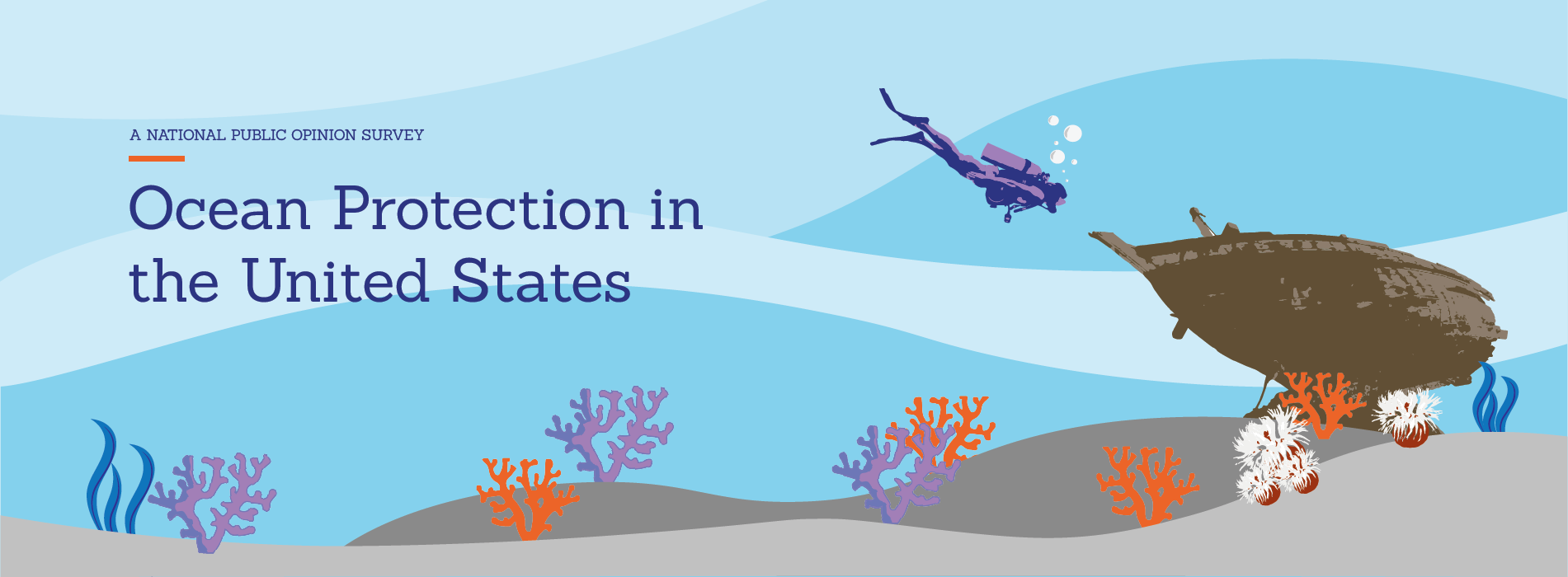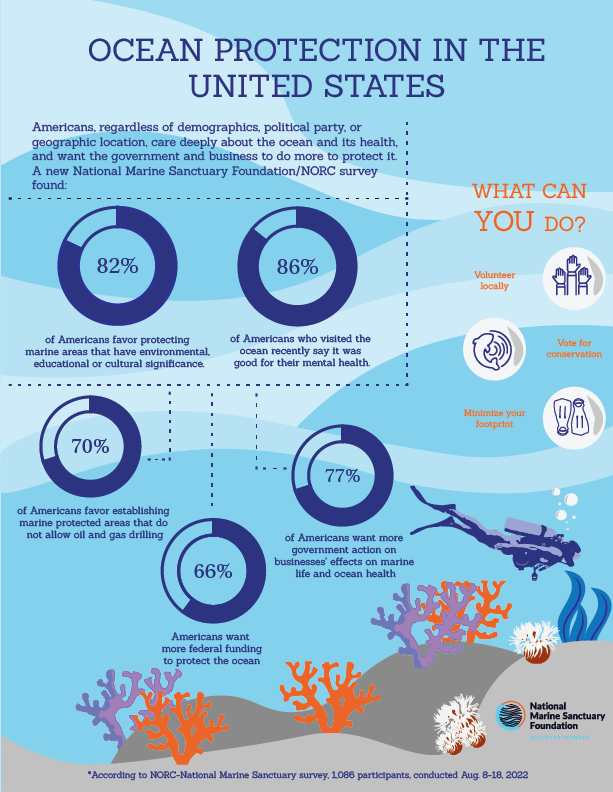
In October, the U.S. celebrates the 50th anniversary of landmark legislation that transformed how we protect our ocean and coasts. One hundred years after the establishment of Yellowstone National Park, the National Marine Sanctuaries Act gave us the means to permanently protect the most nationally significant places in our ocean and Great Lakes. As part of the National Marine Sanctuary System’s anniversary, the National Marine Sanctuary Foundation partnered with NORC at the University of Chicago to conduct a nationwide poll surveying Americans coast-to-coast about ocean conservation, climate change, and their awareness and support for stronger protection.
The data is clear: Americans across the country overwhelmingly value the ocean and agree that it provides many important benefits for people and the planet. However, survey respondents cited strong concerns that the ocean faces a wide range of threats and that not enough is being done to protect it. As a result, Americans strongly support federal and private sector action to protect the ocean and strengthen conservation efforts.

What were the major findings?
Americans, regardless of demographics, political party, or geographic location care deeply about the ocean and its health. They want the government to do more to protect the ocean and ensure business activities do not harm ocean life, according to a National Marine Sanctuary Foundation survey conducted by NORC at the University of Chicago.
Majorities of Americans agree that many of the benefits the ocean provides are very or extremely important. Of those benefits, most (83%) say that the ocean’s role in sustaining marine life and habitats is extremely or very important. Americans also recognize the critical life-sustaining services the ocean provides, such as the air we breathe, the water we drink, and the food we eat.
Those who live near or visit the ocean notice the effects of climate change on the nation’s oceans. Over a third of respondents who live in coastline counties say they have personally seen the effects of climate change on the ocean and coasts and 32% who visited the ocean since 2019 said the same. Americans worry about the impact climate change is having on oceans and ocean life. Fifty-five percent think climate change is having a major impact on habitat loss; 54% say the same about the loss of ocean plants and animals.
National Public Opinion Survey
In October, the U.S. celebrates the 50th anniversary of landmark legislation that transformed how we protect our ocean and coasts. One hundred years after the establishment of Yellowstone National Park, the National Marine Sanctuaries Act gave us the means to permanently protect the most nationally significant places in our ocean and Great Lakes. As part of the National Marine Sanctuary System’s anniversary, the National Marine Sanctuary Foundation partnered with NORC at the University of Chicago to conduct a nationwide poll surveying Americans coast-to-coast about ocean conservation, climate change, and their awareness and support for stronger protection.
The data is clear: Americans across the country overwhelmingly value the ocean and agree that it provides many important benefits for people and the planet. However, survey respondents cited strong concerns that the ocean faces a wide range of threats and that not enough is being done to protect it. As a result, Americans strongly support federal and private sector action to protect the ocean and strengthen conservation efforts.

What were the major findings?
Americans, regardless of demographics, political party, or geographic location care deeply about the ocean and its health. They want the government to do more to protect the ocean and ensure business activities do not harm ocean life, according to a National Marine Sanctuary Foundation survey conducted by NORC at the University of Chicago.
Majorities of Americans agree that many of the benefits the ocean provides are very or extremely important. Of those benefits, most (83%) say that the ocean’s role in sustaining marine life and habitats is extremely or very important. Americans also recognize the critical life-sustaining services the ocean provides, such as the air we breathe, the water we drink, and the food we eat.
Those who live near or visit the ocean notice the effects of climate change on the nation’s oceans. Over a third of respondents who live in coastline counties say they have personally seen the effects of climate change on the ocean and coasts and 32% who visited the ocean since 2019 said the same. Americans worry about the impact climate change is having on oceans and ocean life. Fifty-five percent think climate change is having a major impact on habitat loss; 54% say the same about the loss of ocean plants and animals.
Why Does it Matter?
Life on earth is not possible without the ocean. The wide variety of life in our ocean and its ecosystems literally underpins the health of the planet and our social and economic well-being. It provides 50 percent of the air we breathe and is crucial to the freshwater cycle on earth.
The ocean absorbs 26 percent of human-caused carbon emissions – 20 times more than what is absorbed by plants and soil on land. Yet 60 percent of the world’s major marine ecosystems have been degraded, posing major threats to the ocean’s ability to regulate the climate.
Marine protected areas (MPAs) are one of the most effective tools to protect the ocean. U.S. ocean waters cover 4.5 million sq. miles and span from the icy cold gray waters of the Arctic to the warm tropical blue waters of the Caribbean Sea. To protect our ocean and Great Lakes for the benefit of current and future generations, the U.S. needs a national system of protected areas in our ocean — similar to our national parks and wildlife refuges — that represent diverse ecosystems and protect biodiversity and its contributions to people.
How Can You Help?
Why Does it Matter?
Life on earth is not possible without the ocean. The wide variety of life in our ocean and its ecosystems literally underpins the health of the planet and our social and economic well-being. It provides 50 percent of the air we breathe and is crucial to the freshwater cycle on earth.
The ocean absorbs 26 percent of human-caused carbon emissions – 20 times more than what is absorbed by plants and soil on land. Yet 60 percent of the world’s major marine ecosystems have been degraded, posing major threats to the ocean’s ability to regulate the climate.
Marine protected areas (MPAs) are one of the most effective tools to protect the ocean. U.S. ocean waters cover 4.5 million sq. miles and span from the icy cold gray waters of the Arctic to the warm tropical blue waters of the Caribbean Sea. To protect our ocean and Great Lakes for the benefit of current and future generations, the U.S. needs a national system of protected areas in our ocean — similar to our national parks and wildlife refuges — that represent diverse ecosystems and protect biodiversity and its contributions to people.
How Can You Help?
Additional Findings
A majority of Americans agree that many of the benefits the ocean provides are very or extremely important. Most (83%) agree that the ocean’s role in sustaining marine life and habitats is extremely or very important. Americans also recognize the importance of services provided by the ocean, such as the air we breathe (80%) and being a source of food (72%).
Americans recognize the importance of ecosystem services that the ocean provides
Americans recognize the importance of ecosystem services that the ocean provides
A majority of Americans agree that many of the benefits the ocean provides are very or extremely important. Most (83%) agree that the ocean’s role in sustaining marine life and habitats is extremely or very important. Americans also recognize the importance of services provided by the ocean, such as the air we breathe (80%) and being a source of food (72%).
Over 4 in 10 say that health of U.S. ocean waters is poor or very poor.
More Americans rate the health of ocean environments in the United States as poor or very poor (43%) compared to those who rate it good or very good (16%). Another 40% rate the health of ocean environments as neither good nor poor.
Over 4 in 10 say that health of U.S. ocean waters is poor or very poor.
More Americans rate the health of ocean environments in the United States as poor or very poor (43%) compared to those who rate it good or very good (16%). Another 40% rate the health of ocean environments as neither good nor poor.
Most Americans think that the U.S. Federal government should be doing more to protect the ocean. Over half (55%) of those surveyed believe that the government is doing too little in terms of protecting the ocean, while a slim minority (7%) believe that the government is doing too much.
Majority of Americans think the federal government is not doing enough to protect the ocean
Majority of Americans think the federal government is not doing enough to protect the ocean
Most Americans think that the U.S. Federal government should be doing more to protect the ocean. Over half (55%) of those surveyed believe that the government is doing too little in terms of protecting the ocean, while a slim minority (7%) believe that the government is doing too much.
Read the full survey report HERE
